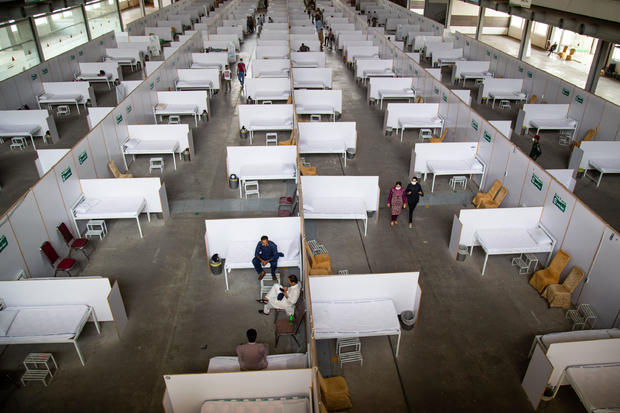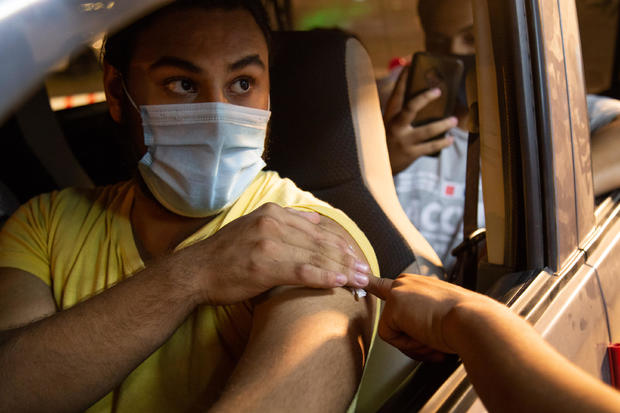Corona Extra Shops in Blue Area Isb Pakistan
Millions of Pakistanis threatened with cell phone cut-off if they don't get a COVID vaccine
Islamabad — Pakistan's most populous province, Punjab, has decided to combat residents' COVID-19 vaccination hesitancy by threatening to block cell phone service to anyone who refuses inoculation. The decision to issue the threat came out of a meeting last week, led by provincial Health Minister Dr. Yasmin Rashid, as officials scrambled for ways to boost the province's dismal vaccination rate.
Rashid said protecting citizens from the coronavirus was the main priority for the Punjab government, and "only a vaccine can end the COVID-19 pandemic."
The provincial government had hoped to be vaccinating 420,000 people per day, with the goal being to inoculate most of its population of 67 million by the end of the year. But only about 52,000 people per day have been coming forward to get a shot.
Pakistanis are generally not well-informed about the importance of inoculation against the coronavirus, and many remain deeply worried about the side effects experienced by a lot of people who get the shot.
The government has done a poor job explaining that some symptoms are generally considered a sign that the vaccine is working. But, as is the case around the globe, the phenomenon of fake news has also contributed to widespread hesitancy in Pakistan, with social media and messaging services being the primary perpetuators of misinformation.
In a country where the populace has remained broadly suspicious of vaccination campaigns for decades, the Punjab government's threat to penalize people for not getting the shot has been criticized as draconian. There's fear it could backfire, fueling mistrust in the government, and crucially, in the new vaccines.
Pakistanis have been wary of vaccines for many years — long before the world knew the word coronavirus. Many here believe vaccinations in general are part of a government plan to either render people infertile for the purposes of population control, or a CIA conspiracy to microchip and monitor civilians. The CIA's purported reliance on a fake Hepatitis B vaccination campaign in the country to track downOsama bin Laden reinforced those fears.
Pakistan's government has been ineffective at dispelling the myths, but it has ramped up efforts to build trust recently, including with information campaigns in the mainstream media.
The National Command and Operation Center (NCOC), tasked with fighting the pandemic in Pakistan, released a video on Sunday aimed at educating citizens about the importance of inoculation and quashing the misconceptions. The video, which the NCOC ironically made in collaboration with a major cellular network service provider, tells Pakistanis that vaccination is the only way to avoid coronavirus infection, and that people who contracted the virus now regret not getting the vaccine.
All of the country's major newspapers carried government ads on Monday urging people to get vaccinated.
The national NCOC has not followed Punjab's lead, so there has been no threat to cut off mobile access to non-vaccinated Pakistanis outside of the province. It would be a bold move if they did.
Punjab's government has effectively threatened to disconnect thousands of people from the internet. Most Pakistanis go online exclusively on their phones, rather than on traditional laptop or desktop computers, so the disruption to everyday life would be huge.
Shandana Khan, CEO of the local NGO Rural Support Programmes Network, which has worked with authorities to help mobilize communities' response to the virus, told CBS News that blocking the SIM cards of people who don't get vaccinated could prove unwise.
"In many rural areas where phones are critical to transfer money, take micro-credit, etc., and where vaccines are not readily available, this approach is not likely to work," she said. "In fact, it will create further problems. There are not enough vaccines at this point either. Getting vaccines and improving outreach in Punjab villages is crucial. Remote villages have no vaccines available, so a door-to-door campaign may be the convincing factor."
Pakistan's mobile service providers are waiting to see what happens, as they've received no notification yet from the Pakistan Telecom Authority, which oversees their business, of any official order to cut service to anyone.
Aamir Pasha, spokesperson for the mobile service provider Ufone, told CBS News that as of Monday, the company regards the statements by Punjab officials as proposals, or even rumors, and until a bill is passed by the national government and they're formally asked — and provided with the exact parameters of any new restrictions — they cannot comment.
With 22 million subscribers nationwide, and given the low rate of vaccinations nationally, the impact on such companies' business would be enormous.
An official from another leading mobile network, who asked not to be named, added that any move by the government to impose rules that directly impact its business dealings would likely be met by a court challenge.
Barrister Abdullah Kahloon, a legal analyst who has been following this Punjab Health Ministry's statements, told CBS News it was "a strange state of affairs, and shows the government's urgency in getting people vaccinated as quickly as possible."
"Different countries have adopted a whole raft of measures — some far more stringent than the ones being proposed by the Punjab government — to tackle the pandemic," Kahloon said.
He added, however, that "the legal position is clear, i.e., the government does have the power to take any steps it feels are reasonable and proportionate in dealing with a crisis that has the potential of endangering lives."
Pakistan's government and the NCOC have said that incentives would be offered to encourage vaccination. But while other countries, including the U.S., have offered lottery tickets, free beer and even free cannabis to lure people in for shots, in Pakistan, so far it's been all stick and no carrot.
In a country where many families struggle to meet even basic needs, an offer of a free bag of flour, for instance, might prove a more effective policy than threatening to cut off their cell phones.
Thanks for reading CBS NEWS.
Create your free account or log in
for more features.
Source: https://www.cbsnews.com/news/pakistan-covid-vaccine-punjab-threat-cell-phone-cut-off-no-vaccination/


0 Response to "Corona Extra Shops in Blue Area Isb Pakistan"
Post a Comment